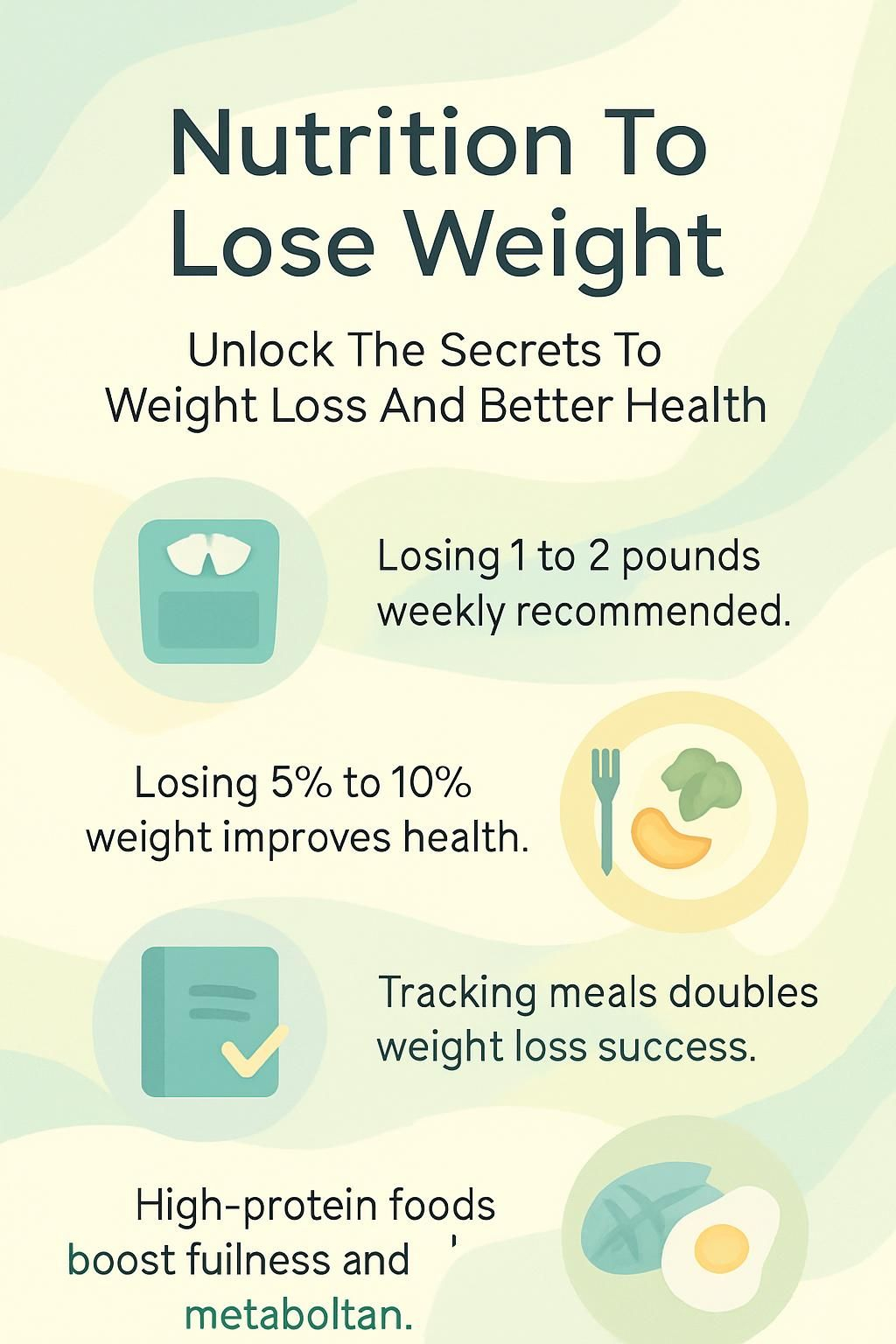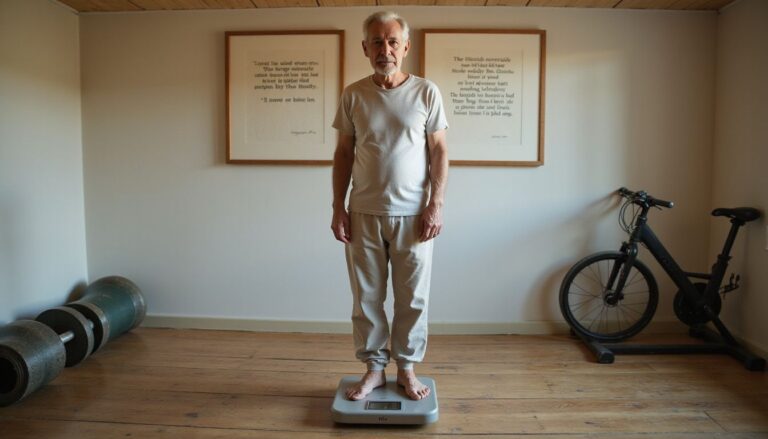Nutrition To Lose Weight: Unlock The Secrets To Weight Loss And Better Health
Our Nutrition Assistant AI Suite will transform your body. You will lose fat, get toned, and build muscle. Gain confidence and optimal health.
Many people want weight loss but feel stuck by confusing advice and slow progress. I have felt that way too. What helped me was focusing on nutrition basics and steady habits that I could keep.
Through trial and research, I learned that eating fewer calories while choosing healthy foods leads to safe results, about 1 to 2 pounds per week. In this guide, I share simple steps that made a difference for me, plus key foods and habits that support better health over time.
Key Takeaways
- A balanced diet in a calorie deficit can support steady loss of 1 to 2 pounds per week, as noted by the Harvard T.H. Chan School of Public Health.
- High protein foods such as chicken, eggs, beans, and strained yogurt increase fullness and help maintain muscle during calorie reduction.
- Whole grains, fruits, vegetables, and healthy fats like nuts and olive oil support long-term weight management and lower disease risk compared with processed foods.
- Modest weight loss, about 5% to 10% of body weight, can reduce cholesterol, blood pressure, and type 2 diabetes risk, according to the American Heart Association and CDC data from 2023.
- Tracking meals with an app or food journal is linked with better outcomes, often doubling the chance of success compared with not tracking, based on CDC research from 2022.

Key Concepts in Nutrition for Weight Loss

Sound nutrition is the base for fat loss and long-term health. I use simple, repeatable habits so my plan is realistic on busy days.
What role do calories play in weight loss?
Calories are a measure of energy from food and drinks. If I take in more energy than I use, my body stores the extra as fat. If I take in less, my body draws on stored fat for fuel.
Most experts suggest a daily deficit of about 500 to 1,000 calories to lose roughly 1 to 2 pounds per week. That pace protects health and feels manageable for many people.
To lose weight, eat fewer calories, move more, or do both.
Tracking what I eat helps me spot portion creep and pick foods that are low in calories and high in nutrients. Understanding the big three macronutrients, protein, carbohydrates, and fat, also helps me build balanced meals.
How do protein, carbs, and fats affect weight loss?
Protein supports fullness and muscle. Foods like poultry, fish, beans, eggs, and strained yogurt help me stay satisfied between meals. Higher protein intake can boost metabolism and reduce cravings by acting on hunger hormones.
Carbohydrates are the body’s main energy source. Complex carbs, such as whole grains, legumes, fruits, and vegetables, contain dietary fiber. Fiber slows digestion, steadies blood sugar, and supports a healthy gut.
Healthy fats from nuts, seeds, olive oil, avocados, and oily fish provide energy without spiking blood sugar. They also add flavor and satisfaction. I include all three macronutrients in most meals to support steady weight reduction and better long-term health.
Why are vitamins and minerals important for losing weight?
Micronutrients, meaning vitamins and minerals, keep metabolism running smoothly. Vitamin D helps regulate appetite signals. Calcium aids fat metabolism. Low iron can cause fatigue, which makes exercise and daily movement harder.
B vitamins help turn carbs into usable energy. Magnesium supports blood sugar control, which affects hunger and energy. Eating a variety of fruits, vegetables, whole grains, and lean proteins helps prevent shortages that can slow progress.
Common Myths About Weight Loss Nutrition
Many popular tips sound helpful but fall apart under research. I learned the hard way that myths often waste time and energy.
Does skipping meals help you lose weight?
Skipping meals may cut calories at first, but it often leads to larger portions later. Reviews link irregular eating patterns with higher body weight and more snacking.
I noticed that skipping made me tired and more likely to grab fast food. Regular, planned meals help me keep portions in check and reduce impulsive choices.
Are all fats unhealthy for weight loss?
Not all fats are the same. Healthy fats can improve fullness and help control cravings, which supports a calorie deficit. I use olive oil, eat nuts and seeds, and add avocado to meals in small portions.
Research highlighted by the Academy of Nutrition and Dietetics shows that diets rich in unsaturated fats can support modest weight loss and better heart health. Limiting saturated and trans fats from processed food is still wise.
Should you completely avoid carbohydrates to lose weight?
Cutting all carbs is not required. Carbs fuel daily living and workouts. Whole grains, fruits, and starchy vegetables provide fiber that aids fullness and gut health.
Studies from 2020 suggest that lowering refined carbs, such as white bread and sweets, supports losing about 1 to 2 pounds per week. I focus on unprocessed foods rather than removing entire food groups.
Best Foods to Support Weight Loss
I build most meals around lean protein, whole grains, and colorful produce. These choices keep me full and make a healthy diet easier to follow.
Which high-protein foods aid weight loss?
Lean meats like chicken or turkey are high in protein for relatively few calories. Eggs are affordable and versatile. Strained yogurt and cottage cheese add protein at breakfast or as a snack.
Plant options such as tofu, lentils, beans, and peas work well too. A small portion of nuts adds both protein and healthy fat. I lean on these foods because reviews show higher protein intake helps protect muscle while reducing weight.
How do fruits and vegetables contribute to losing weight?
Fruits and vegetables are low in calories and high in fiber and water. I can fill half my plate with them and still keep calories in check. That makes calorie restriction feel less strict.
People who increase non-starchy vegetables often lose more weight in trials. I like apples or berries when I crave something sweet. Roasted carrots or steamed broccoli add volume, potassium, and vitamin C while keeping meals satisfying.
What whole grains are best for weight loss?
Whole grains bring steady energy and helpful fiber. Oats have soluble fiber that boosts fullness. Brown rice offers slow-burning carbs for stable energy.
Quinoa provides more protein than many grains. Barley contains beta-glucan, a fiber linked with better cholesterol and appetite control. Swapping white bread for 100% whole wheat bread made my meals more satisfying without extra calories.
Which healthy fats support weight loss?
Healthy fats can calm hunger and improve meal satisfaction. I use avocado, nuts like almonds or walnuts, seeds such as chia or flax, and olive oil in small amounts.
Replacing some saturated fat with unsaturated fat is linked with better heart markers during and after weight loss. Portion size still matters. A 1 ounce serving of nuts has about 160 calories, so I measure rather than eat from the bag.
Popular Diet Strategies for Weight Loss
Many people test different diet strategies. The best plan is one you can stick with while meeting your nutrition needs.
What is a Low-Calorie Diet (LCD) and how does it work?
A Low-Calorie Diet typically allows 1,200 to 1,500 calories for women and 1,500 to 1,800 for men. This creates a calorie deficit that leads to fat loss over time.
In practice, I center meals on lean protein, vegetables, whole grains, and small amounts of healthy fat. Some plans include meal replacements for convenience. Studies show LCDs can help adults with obesity lose weight and improve blood sugar under professional guidance.
What are the effects of a Very Low-Calorie Diet (VLCD)?
A Very Low-Calorie Diet limits intake to 800 calories or less per day. Trials show rapid early loss, sometimes 10 pounds or more within weeks. It can lower blood sugar and improve heart markers in the short term.
There are risks. People may lose muscle, feel tired, or have constipation. Gallstones can also occur with fast fat loss. This approach needs close medical supervision to limit nutrient gaps and other side effects.
How does Intermittent Fasting help with weight loss?
Intermittent fasting alternates between eating and fasting windows. Reviews suggest it can help the body use stored fat for energy without strict daily counting.
I found it easier to manage cravings on a clear schedule. People often see better insulin sensitivity and improved control over total daily intake, which supports long-term weight management.
What is Time-Restricted Eating and does it aid weight loss?
Time-restricted eating limits meals to a daily window, such as 8 or 10 hours. Studies show this method can reduce calories and improve blood sugar control.
For example, a friend ate only between noon and 8 pm while choosing balanced meals. In twelve weeks, she lost ten pounds and reported steady energy. The structure helped her avoid mindless snacking.
Sustainable Eating Habits for Long-Term Weight Loss
Lasting change comes from small steps you repeat. I focus on simple routines that lower stress and prevent weight cycling.
How can portion control help maintain weight loss?
Portion control lowers calorie intake without strict rules. It helps me keep energy balance steady from week to week.
I often use measuring cups or a food scale at home, especially for calorie-dense items like oils, nuts, and dressings. Research from the CDC links portion awareness with better long-term maintenance.
Why should processed foods be avoided for weight loss?
Processed snacks often contain added sugar, sodium, and unhealthy fats. They raise calories fast without providing lasting fullness or key nutrients.
Studies published in medical journals link high intake of processed foods with weight gain. I feel better and stay satisfied longer when I choose whole foods such as fruits, vegetables, nuts, whole grains, and lean protein.
How do plant-based meals support lasting weight loss?
Plant-forward meals tend to be lower in calories and higher in fiber. That combination supports fullness and easier calorie control.
In one 2020 study, adults who ate mostly plants lost about seven pounds more over six months than those eating more animal products. I enjoy bean chili, veggie stir-fries, and oatmeal with fruit because they taste good and keep me full.
The Role of Hydration in Weight Loss
Water supports appetite control and metabolism. I use hydration as a simple daily lever for success.
Why is drinking water important for losing weight?
Drinking two cups of water before meals can trim about 75 to 90 calories per meal. Cold water may boost calorie burn for about an hour.
Swapping soda or sweet tea for water cuts sugar and calories quickly. I also notice that thirst often feels like hunger. A glass of water first saves me from extra snacking.
How do sugary beverages impact weight loss efforts?
Sugary drinks like soda, sweetened tea, and many sports beverages add many calories but little fullness. A single can of soda often has 150 calories and more than 35 grams of sugar.
People who drink fewer sugary beverages tend to have better weight control. Choosing water or unsweetened options strengthens any diet plan and supports long-term health.
How to Create a Balanced Meal Plan
A balanced meal plan helps control calories and delivers key nutrients from every food group. I build meals with fruits, vegetables, whole grains, protein, and healthy fats.
What is the ideal plate composition for weight loss?
Half the plate: non-starchy vegetables like salad greens, broccoli, tomatoes, or carrots. One quarter: lean protein such as chicken breast, fish, tofu, or eggs. One quarter: whole grains or starchy vegetables like brown rice, quinoa, or sweet potatoes.
I add a small portion of healthy fat, such as a few slices of avocado or a measured sprinkle of nuts. This balance supports fullness and steady energy while keeping calories in check.
How can meal prepping improve your weight loss plan?
Meal prepping builds structure and reduces last-minute choices. I prepare protein, chop vegetables, and cook grains in batches on one day.
People who plan meals are more likely to follow their plan and avoid high-calorie takeout. Studies from 2017 link meal planning with better diet quality and lower obesity rates. Prepping saves time and money, and it keeps my portions consistent.
The Connection Between Nutrition and Physical Activity
Eating well and moving more work together. The right fuel leads to stronger workouts and better recovery.
Which foods best fuel exercise for weight loss?
Before workouts, I aim for a mix of carbs and protein. Oatmeal with yogurt, chicken with brown rice, or a banana with a small yogurt cup all work well.
Leafy greens add nutrients without many calories. A small serving of nuts can support stamina, but I watch portions. These choices give me steady energy and help me train harder.
What should you eat after a workout to support weight loss?
After exercise, I choose a small meal or snack with both protein and carbs. About 20 grams of protein helps muscles repair and grow.
Examples: strained yogurt with berries, grilled chicken on whole grain toast, or a banana with a measured spoon of peanut butter. Research in 2019 suggests pairing complex carbs with lean protein supports greater fat loss than low-protein recovery meals. I drink water first, then eat.
Health Benefits of Proper Nutrition and Weight Loss
Healthy eating and weight loss can improve many health markers. The gains build over time and make daily life easier.
How does weight loss improve heart health?
Losing weight can lower blood pressure and improve cholesterol levels. A reduction of 5% to 10% of body weight may decrease heart disease risk, based on American Heart Association guidance.
As I lost inches around my waist, my resting heart rate dropped. That meant less strain on my heart and better stamina during daily tasks.
What impact does weight loss have on blood sugar levels?
Weight loss helps the body use insulin more effectively, which lowers blood sugar. A 5% to 10% reduction in body weight can reduce A1C by up to one point for people with type 2 diabetes.
I saw my fasting glucose move from prediabetes to normal after losing about 7% of my weight. Whole foods and portion tracking made a clear difference.
How does proper nutrition reduce chronic disease risks?
Eating plenty of vegetables, fruits, whole grains, lean proteins, and healthy fats reduces inflammation and supports normal blood pressure and cholesterol. These habits lower the chance of heart disease, type 2 diabetes, and some cancers.
Switching from processed snacks to plant-forward meals gave me more energy and fewer cravings. Small changes add up to major health benefits over time.
Risks of Poor Nutrition During Weight Loss
Crash dieting can backfire. Protecting your health keeps progress steady and safe.
What nutrient deficiencies can occur with bad dieting?
Very low-calorie or unbalanced diets can cause shortages of iron, vitamin B12, calcium, vitamin D, and vitamin C. I once felt worn out after weeks of eating too little, and my blood work showed low iron and B12.
Deficiencies can harm immunity, weaken bones, and slow recovery from workouts. Including a variety of nutrient-dense foods helps prevent these problems.
How does poor nutrition cause muscle loss during weight loss?
If I do not eat enough protein, the body pulls from muscle to meet energy needs. That lowers strength and slows metabolism.
Research suggests adults need at least 0.8 grams of protein per kilogram of body weight daily, and often more during weight loss. I protect muscle by eating protein at each meal and lifting weights two or three times per week.
Why can metabolism slow down with inadequate nutrition?
Eating too few calories for too long can lower resting metabolic rate. The body adapts by burning fewer calories at rest, which makes further loss harder.
Low protein intake worsens the decline because muscle burns more calories than fat. I felt cold and tired during a strict phase, which was a sign to raise calories and rebalance my meals.
Tracking Progress and Staying Motivated
I track my food and set realistic targets. Seeing progress keeps me going on hard days.
How can food journals or apps help track weight loss?
Food logs show trends I would miss otherwise. Entries include calories, protein, carbs, fats, and sometimes sodium or sugar.
According to CDC research from 2022, people who track lose about twice as much as those who do not. Charts and weekly summaries help me adjust sooner and stay on plan.
What are realistic goals for successful weight loss?
Most experts suggest aiming for 1 to 2 pounds per week. That pace supports healthy weight maintenance and reduces the risk of muscle loss or nutrient gaps.
Even a 5% to 10% reduction improves blood pressure, cholesterol, and blood sugar. I set small milestones, celebrate each one, and then set the next. It keeps motivation high.
Seeking Professional Guidance
I reach out to a registered dietitian for personalized advice. Professional support improves safety and results, especially if I have medical conditions.
When should you consult a dietitian or nutritionist?
If you have diabetes, high blood pressure, food allergies, or unexplained weight changes, expert help can guide your plan. A dietitian can tailor menus to medications and lab results.
I booked an appointment after weeks of stalled progress and low energy. The plan we built fit my life and moved the scale again.
What are the benefits of structured weight-loss programs?
Structured programs offer clear steps, check-ins, and social support. People in these programs often lose more and keep it off longer than those who go solo.
I joined one after yo-yo dieting for years. The routine, food tracking, and coaching made portion control much easier and helped me build lasting habits.
Tips for Maintaining Weight After Reaching Goals
Maintenance is a skill you practice daily. I keep simple routines so small slips do not snowball.
How can you build lifelong healthy eating habits?
I start with small changes I can repeat. Most meals include vegetables, fruits, lean protein, and whole grains. I plan ahead and keep healthy snacks ready.
Tracking intake helps me spot triggers and patterns. Setting clear goals and getting support from friends or family keeps me consistent during busy weeks.
Why is regular weight monitoring important after weight loss?
Weekly check-ins catch small gains early. I use a digital scale once a week and note the number in my app.
The National Weight Control Registry reports that most people who maintain long-term loss weigh themselves weekly or more often. This simple habit keeps me accountable and focused.
Conclusion
Focusing on nutrition for weight loss improved my energy, mood, and health. Choosing nutrient-dense foods, eating mindfully, and staying hydrated led to steady results. Research from sources like the Harvard T.H. Chan School of Public Health supports a balanced approach combined with regular activity.
I track meals and aim for small weekly wins. These habits helped lower my risk for heart disease and type 2 diabetes, which matches CDC guidance from 2023. If you have a medical condition, talk with a health professional before making big changes. Simple, consistent steps build a healthier body and a plan you can keep.
FAQs
1. What are the most important nutrition tips for weight loss and better health?
Eating more vegetables, fruits, lean proteins like chicken or fish, and whole grains helps with weight loss. Limiting foods high in sugar or fat supports a healthy body. Drinking water instead of sugary drinks also makes a difference. Studies show that people who eat balanced meals lose more weight than those who skip meals.
2. How many calories should I eat each day to lose weight safely?
Most adults need about 500 fewer calories per day to lose one pound each week, according to research from the Centers for Disease Control and Prevention (CDC). For example, if you usually eat 2,000 calories daily, aim for 1,500 calories while still getting enough nutrients.
3. Can tracking what I eat help me reach my goals faster?
Tracking food intake can double your chances of losing weight based on data from clinical trials published in Obesity Reviews. Writing down everything you consume increases awareness of eating habits; this often leads to healthier choices over time.
4. Is it safe to follow popular diets like low-carb or intermittent fasting for long-term health?
Some meal plans such as Mediterranean-style eating have strong evidence supporting both short- and long-term benefits including heart health and steady fat loss (Harvard T.H. Chan School of Public Health). Extreme restrictions may cause nutrient gaps; always consult a registered dietitian before starting any new plan.
Summary: Eating nutritious foods in proper amounts aids both fat reduction and overall wellness when combined with mindful tracking methods supported by scientific studies.







